David Cameron pledges tax cuts 'for 30m people'
- Published
- comments
David Cameron: 'We want to cut more of your taxes'
David Cameron has pledged to cut taxes for thirty million people if the Conservatives win next year's election.
In a speech which ended his party's conference, the PM said he would raise the tax-free allowance from £10,500 to £12,500 by 2020.
He also said the threshold for the 40p income tax rate would be raised from £41,900 to £50,000 by the end of a five-year Conservative government.
The changes would back people who "do the right thing", he said.
Both tax reform proposals - the timing of which the party said depends on economic circumstances - received lengthy ovations.
Mr Cameron also promised:
A Conservative government would protect the NHS budget for England
He would "deliver" on a pledge of "English votes for English laws"
The UK could not "walk on by" in the battle with Islamic State extremists
Immigration would be at the heart of his EU negotiation strategy
A vote for UKIP at the next election would be "a vote for Labour"
He would scrap the Human Rights Act
Every teenager could have a place on the National Citizenship Service
Increasing the personal allowance would take one million of the lowest-paid out of income tax and give a tax cut to 30 million more, Mr Cameron said.
David Cameron to Labour on NHS plans: 'I just think, how dare you?'
Somebody working a 30-hour week on the minimum wage would pay no income tax, he said: "Nothing, zero, zilch."
The Institute for Fiscal Studies said the combined cost of the tax changes would be £7.2bn by 2020.
Raising the threshold for the 40p tax band would be worth £1,600 a year to those earning £50,000, benefiting an estimated 800,000 taxpayers.
'Strong economy'
The NHS pledge is a repeat of the policy on which the Conservatives fought the 2010 general election.
He was given a standing ovation as he criticised what he said were "complete and utter lies" from the Labour Party on the NHS.
A future Conservative government would protect the NHS budget, he said, adding: "You can only have a strong NHS if you have a strong economy."
Mr Cameron hailed NHS advances in DNA research - and paid tribute to the NHS treatment given to his profoundly disabled son Ivan, who died in 2009.
"For me, this is personal," he said, and with both he and his watching wife Samantha looking close to tears, he added that his family knows "more than most" the importance of relying on the health service.
He said: "How dare they suggest I would ever put that at risk for other people's children?"

Analysis: Ben Wright, BBC political correspondent
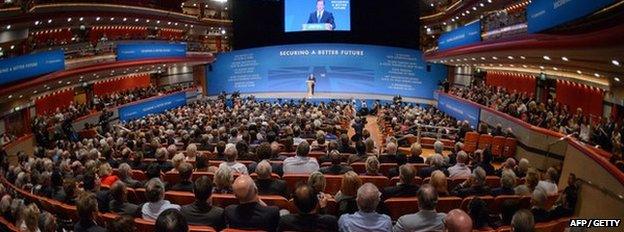
It was the tax cut promise a Conservative conference has waited years to hear.
Raising the 40p income tax threshold to £50,000 was a pledge that lifted the roof. Tory candidates and canvassers have been given an easy to understand, middle class tax cut to take into the general election next May.
And this speech framed the election as a sharp choice between two parties: The Conservatives and Labour. There was barely a mention of UKIP. The central message was simple: Britain is on the right track, don't turn back.
The attack on Labour was ferocious and David Cameron tried to seize large chunks of their traditional territory.

The PM also spoke of his pride in Britain after the Scottish referendum result and the D-Day anniversary.
In his speech he made a "vow" to deliver reforms to ensure there were English votes for English laws in Parliament following the 'No' vote in the Scottish independence referendum.
He also said there was "no walk-on-by" option in the battle against the "evil" Islamic State, adding that if the UK did not deal with them, "they will deal with us".
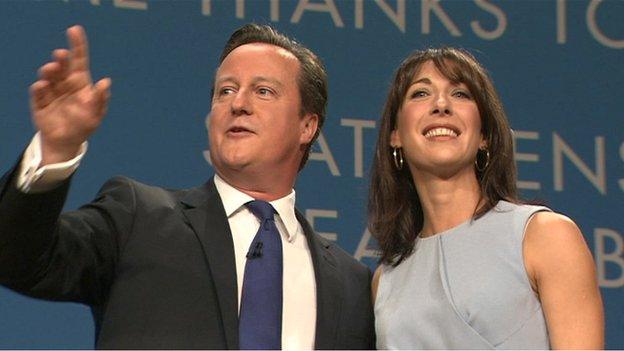
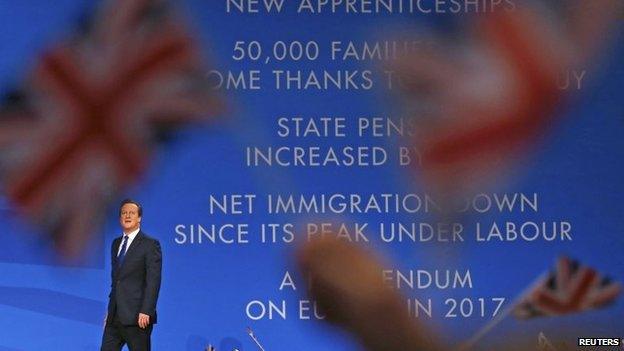
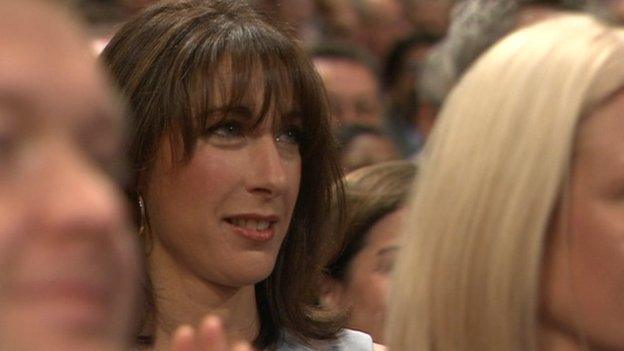
Samantha Cameron watches her husband deliver his speech
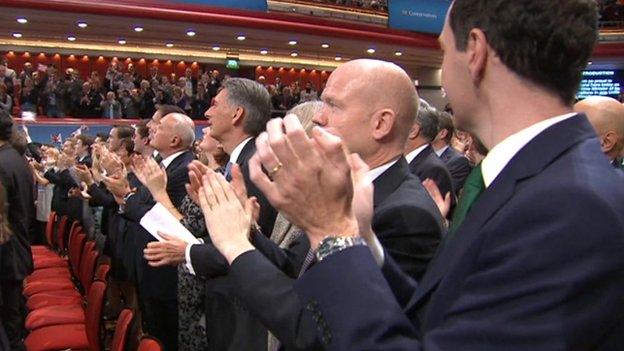
The PM did a William Hague impression as he paid tribute to the ex-Foreign Secretary
In an attack on Labour, Mr Cameron said the Conservatives were "the real party of compassion and social justice" and promised a crackdown on zero-hours contracts.
Unveiling a plan to build 100,000 new affordable homes only available to first-time buyers, Mr Cameron said the Tories were "the party of home ownership once again".
Help for people trying to get on the housing ladder was also pledged, and Mr Cameron said people would have to "work a bit longer and save a bit more".

Analysis: Simon Gompertz , BBC personal finance correspondent
David Cameron's two big tax promises address some of the burning issues for taxpayers. One is that those on low incomes are struggling to meet their commitments because wages continue to rise much more slowly than prices.
The prospect of a significantly higher personal allowance shows them a glimmer of light at the end of the tunnel. It could take a million out of tax altogether.
At the other end of the tax spectrum, the government has faced criticism that increasing numbers are being drawn into the 40% income tax bracket, even though they would not think of themselves as well off.
Tax cut plans: The effect on you
A £50,000 threshold would pull hundreds of thousands out of the teeth of the higher rate trap. But as with all tax measures, it will be vital to watch how they are implemented.
The longer it takes to bring them in, the less they are worth. As things stand, many of the low paid will continue to pay National Insurance, even if they escape income tax. And many will worry that other taxes, including National Insurance, might be raised to finance these two giveaways.

Mr Cameron also paid tribute to House of Commons Leader William Hague, who is stepping down as an MP next year, calling him "our greatest living Yorkshireman".
Referring to planned spending cuts of £25bn in the first two years of the next Parliament, he said: "That's a lot of money, but it is doable."
David Cameron impersonates former party leader William Hague's famous speech to the conference as a child
Turning to the issue of Europe, Mr Cameron said he would not "take no for an answer" in EU negotiations ahead of a referendum in 2017.
UKIP threat
"When it comes to free movement, I will get what Britain needs," he said, asking people to judge him by his record in vetoing EU treaties and supporting a budget cut.
"Around the table in Europe they know I say what I mean and I mean what I say."
Addressing the issue of UKIP, to which two Tory MPs have recently defected, Mr Cameron said: "If you vote UKIP, that is really a vote for Labour.
"And here's a thought for you. On 7 May you could go to bed with Nigel Farage and wake up with Ed Miliband."
The Conservative Party has unveiled a string of policies this week - on health, housing and pensions - that it hopes will show voters it is on their side.
Chancellor George Osborne announced a two-year freeze on working-age benefits, criticised by some as an attack on the poor.
The conference has also been overshadowed to some extent by rumours about possible further defections after MP Mark Reckless's surprise decision to jump ship to UKIP.
After Mr Cameron's speech, former Conservative Party donor Arron Banks announced he was donating £1m to Nigel Farage's party.
He had been intending to give £100,000 but had raised that to £1m after, he said, William Hague suggested he was a "nobody".
The former foreign secretary said he had never heard of Mr Banks, who previously gave £25,000 to the Tories.
'Pinch of salt'
The prime minister's task was to banish the defections from his party's mind and give them a clear message to sell to voters on the doorstep next May.
"If our economic plan for the past four years has been about our country, and saving it from economic ruin, our plan for the next five years will be about you and your family and helping you get on," he said.
Mr Cameron chose to deliver his speech from behind a lectern with notes - in contrast to Labour leader Ed Miliband who last week was criticised for forgetting key passages of his memorised speech to his party's conference.
Newsnight's Duncan Weldon uses his scales to work out how David Cameron's proposed tax cuts will balance the economy
But, after the prime minister's address, Mr Miliband said: "David Cameron doesn't realise what is happening in our country. The NHS is sliding backwards, people can't get to see their GP, people are waiting for hours in A&E."
Mr Miliband said the Conservatives had decided "to hit the incomes of working people by freezing their tax credits" and had then offered unfunded "vague, pie-in-the sky commitments".
Lib Dem Chief Secretary to the Treasury Danny Alexander criticised what he called a "shameless attempt to copy Liberal Democrat tax policy".
Tax cuts in this parliament had only been delivered because of the "determination and commitment" of the Conservatives' coalition partners, he said.
UKIP economic spokesman Patrick O'Flynn said Mr Cameron was "imitating" his party's "tax-cutting agenda" and challenged the Conservatives to scrap inheritance tax.
The Green Party said the pledge to freeze the NHS budget was "largely meaningless", saying the government had inflicted "deep wounds" to the service.
Robert Joyce, of the Institute for Fiscal Studies, said the tax cuts would cost more than twice the amount raised by the benefit freeze announced by Mr Osborne.
And he said other departments would feel the "squeeze" as a result of health spending being protected.
Business group the CBI backed "stronger incentives" to get people into work, while the Taxpayers' Alliance said the tax changes were "incredibly good news".